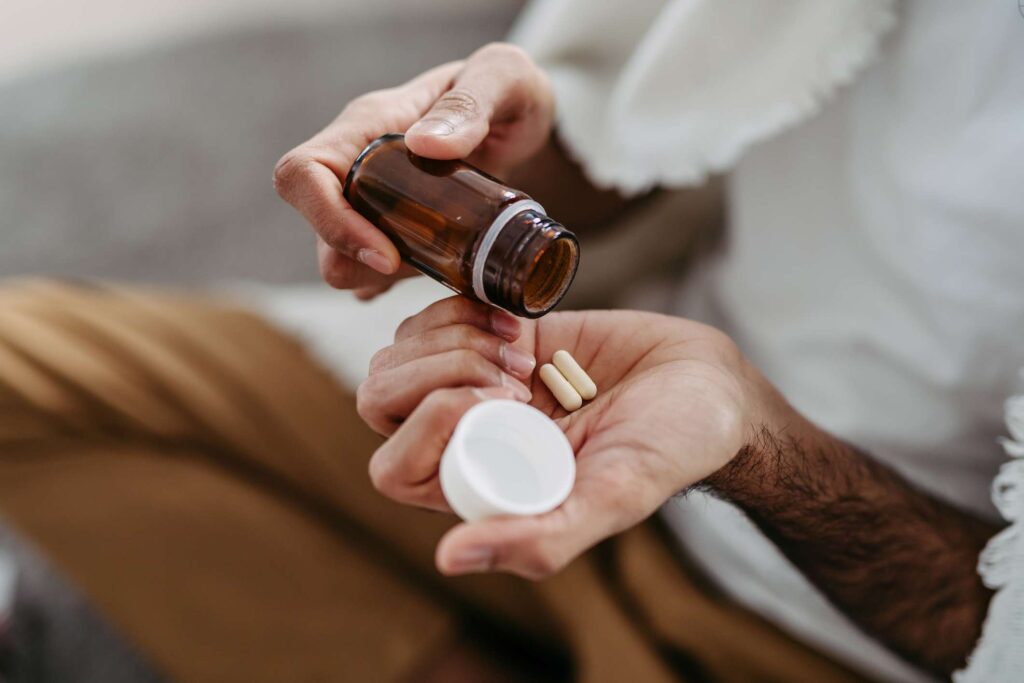High blood pressure (hypertension) is a condition that affects more than one billion people worldwide. Treating hypertension is necessary to lower your risk for other health conditions, like heart attack or stroke. Certain vitamins and supplements, like licorice root and St. John’s wort, can affect your blood pressure or make your blood pressure medication less effective.
Vitamin D is a vitamin naturally found in certain foods and available as a supplement. Your body also makes vitamin D when your skin is exposed to ultraviolet (UV) rays from the sun. Vitamin D is necessary for many body functions, like bone health and inflammation.
Some researchers have found that vitamin D may help treat high blood pressure, specifically doses between 200 to 8,000 International Units (IU) per day. Doses of vitamin D larger than 10,000 IU per day can lead to dangerous side effects, like high levels of calcium (hypercalcemia). Hypercalcemia can cause many issues over time, including high blood pressure.
High doses of vitamin D can also interact with certain diuretics (water pills) used to treat high blood pressure. This interaction can cause your body to not get rid of enough calcium, raising your calcium levels and possibly raising your blood pressure.
Talk to your primary care provider about your vitamin D levels. They can test your levels to determine if vitamin D supplementation would be useful for you and your blood pressure.
Licorice root (Glycyrrhiza glabra) is an herb used as a flavoring in food, candy, and tobacco products. In traditional medicine, the root has been used to treat lung disease, liver disease, and wounds.
Licorice contains glycyrrhizic acid (GA), an ingredient that can raise blood pressure and cause serious side effects if you have high blood pressure. GA doses as low as 100 milligrams daily have been shown to raise blood pressure.
Supplements with GA can also interact with diuretics and blood pressure medications. The supplement may affect how well blood pressure medication works and raise your risk of side effects. Specifically, licorice root can raise sodium levels and lower potassium levels in your body. This effect, combined with a diuretic, can lead to dangerously low levels of potassium.
If you have high blood pressure, it’s best to avoid using products with licorice root.
St. John’s wort (Hypericum perforatum) is a plant used to treat symptoms of depression and menopause. Despite its historical use as a traditional medicine, the plant may dangerously interact with a variety of medications. St. John’s wort weakens the effects of many medications, including some used to treat high blood pressure.
Examples of blood pressure medications that interact with St. John’s wort include:
- Procardia (nifedipine)
- Talinolol
- Verelan (verapamil)
These interactions likely occur because St. John’s wort blocks the medication from being absorbed in the body as it normally would.
Talk with your healthcare provider before taking St. John’s wort. They can tell you if the supplement may interact with any other medications or supplements you are taking.
Arnica is a flower in the sunflower family. The flower has been used to help with bruising, inflammation, and swelling when applied directly to the skin.
Experts recommend against taking arnica by mouth due to a risk for significant side effects. These side effects may include high blood pressure, increased bleeding, vomiting, diarrhea, and damage to your heart or other organs.
Bitter orange (Citrus aurantium) is taken from the fruit or peel of a bitter orange. The fruit and its peel can be used to add flavor to drinks or aromas to perfumes. The bitter orange supplement is often used to help with weight loss and improve sports performance.
Bitter orange contains p-Synephrine, a type of stimulant similar to ephedrine. The U.S. Food and Drug Administration (FDA) has banned ephedrine stimulants because they can cause health issues like stroke and heart attack. Though bitter orange is not banned, it should be used with extreme caution.
Studies have shown that bitter orange supplements can raise blood pressure and heart rate. The supplement can also raise your risk for other serious side effects like stroke and heart attack. However, bitter orange found in food and drinks is not likely to affect your blood pressure or cause these side effects.
Talk with your healthcare provider before taking bitter orange.
People may respond to certain supplements differently. Factors that may affect how you respond to a supplement include genetics, diet and nutrition, age, gut health, and overall health status. Take note of any side effects or symptoms you experience when starting a new supplement or vitamin.
Before starting any new vitamins or supplements, talk to your doctor. They can help you decide if the vitamin or supplement would be useful and safe for you to take. Your doctor can also compare the new supplement to all the medications, vitamins, and other supplements you already take to identify potential interactions.


